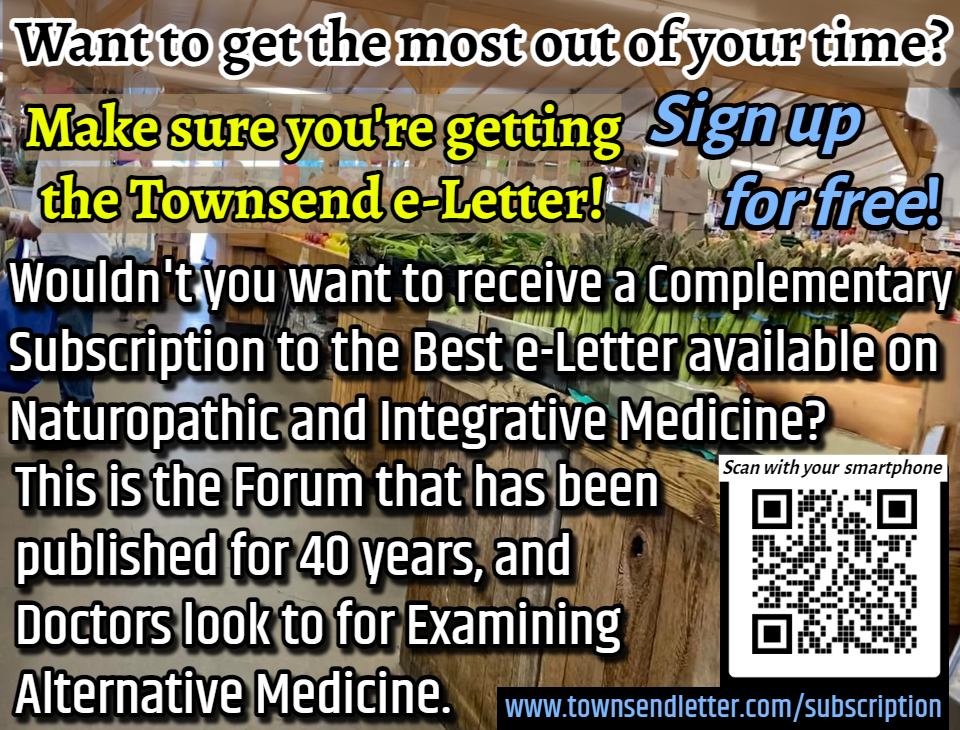Douglas Lobay, ND
Mr. Sutherland was an imposing figure. He was a tall, big man with dark hair parted to one side who wore distinctive, black-rimmed glasses. He was my grade ten science teacher. He spent most of the time talking about how hard life was in the real world. He would often give examples. He told the story how when he was eight years old, he lost his gloves in the school yard in the middle of a winter storm. When he returned home with no gloves his father made him go back to the school yard with a rake to find them. He was cold and tired.
Mr. Sutherland would repeat the mantra of the scientific method. “A hypothesis is a statement with the words if and then. If this is done, then this should result.” The scientific method uses objective data to explain natural phenomena. It uses careful observation and healthy skepticism to explain observed results. It eliminates bias by removing personal cognitive assumptions that can skew experimentation, influence results and distort reality. The scientific method encourages healthy debate to question all methods and results.
On a recent trip to Italy and Greece I discovered that sometimes serendipity is fortuitous. In hindsight I realized that this taxi driver was probably not the top of his class. He appeared as a dishevelled and paunchy but also affable and well-meaning older individual who was missing a few teeth. We used Google translate from English to Greek and vice versa to communicate on the way in from the airport to our hotel in downtown Athens. He apologized for his incessant eructation, as he had consumed a large quantity of garlic the night before. His driving skills were slightly unusual as he would speed up and slow down intermittently for no apparent reason. His cup holder on the dashboard held what looked like a Greek energy drink. He laughed and wiggled the can as he was consuming it and told me it was the alcohol drink Ouzo. I think he was joking. I asked him what was the best Greek food to try, maybe moussaka or souvlaki? He said I should try the goat stew.
The breakfast bar on the tenth floor of the Astor hotel had an impressive view of the Parthenon sitting atop the Greek Acropolis. The Agora was the name given to the marketplace located just below the Acropolis and was the commercial and cultural center of ancient Greek life. It was in the Agora that Socrates gave his informative and thought-provoking lectures.
Socrates was an ancient Greek intellectual, in 400 BC, who is often regarding as the father of modern western philosophy. He was responsible for developing what is called the Socratic method of inquiry. The Socratic method is an inquisitive form of dialogue between individuals that encourages healthy questions and answers. He used inductive reasoning to ask a series of logical questions to defend and explain a person’s reasoning and conclusions. In short, Socrates told people to question everything. Socrates was also famous for a quote “I am the wisest man alive, for I know one thing, and that is that I know nothing.”
History is rife with ideas and theories that were once considered gospel truth only to be found as false and inaccurate.
The earth was once considered to be the center of the universe. The sun was believed to revolve around the earth. The Italian astronomer Galileo suggested that the earth actually revolved around the sun. Modern scientists and religious clergy branded him a heretic. He was arrested and convicted of fraud and deception and was confined to house arrest for the rest of his life. Many others who presented theories contrary to the mainstream narrative on other topics met a less fateful fortune.
Bloodletting was a commonly accepted medical practice for hundreds of years. Mercury was given as an antibiotic and anti-inflammatory. Washing hands between childbirth deliveries between different patients was frowned upon. Frontal lobotomies were considered a standard of care for anxiety and chronic deception. Cigarette smoking was once promoted by doctors as a cure for asthma and colds. Thalidomide, a drug given for nausea during pregnancy, actually caused birth defects. There are many more examples of ideas pedaled as mainstream dogma that turned out to utterly false and harmful.
The kettle calling the pot black is a classic example of the perpetrator being guilty of exactly what they are accusing the other of. Changing definitions and goal posts is okay if it fits your narrative. The Brittanica encyclopedia defines a hypocrite as “a person who claims or pretends to have certain beliefs about what is right but who behaves in a way that disagrees with those beliefs.” Questioning and debating a theory or practice is the foundation of good science. When did it become illegal or immoral to do so?
Trust the science. Accept the mainstream narrative without question. Even though a clear conflict of interest between the scientist developer and the retail industry is okay to ignore in this case. Don’t do your own research. Take a treatment that may not even work that well. It may not really prevent you from getting sick. And it may not prevent you from getting someone else sick. Okay, maybe it prevents you from becoming really sick and out of hospital. Don’t forget about possible side effects. We are not really sure about the side effects. And don’t even think about origins. To suggest something contrary to the mainstream narrative is heretical. And worse yet, you could be branded a conspiracy theorist.
It is better to be honest. It would have been better to say we are not sure. At this point, this is what we believe is the best treatment. We will adjust our response as the science evolves. We are open to questions and clear debate. We will try to follow the scientific method. It is clear that situation was fluid and dynamic and absolute truths did not exist.
Trust is the basis of many relationships between humans. Trust is a firm, unwavering belief and support in the truth of something. In recent years, the mantra “trust the science” has been broadcast to encourage unwavering and unquestioning support of certain public health measures. It would seem that distortions of truth to fit a personal narrative have been nefariously employed. When trust has been broken it damages and undermines a relationship. A broken and fractured relationship is not healthy. Being honest and admitting shortcomings is seen as the beginning of fixing a damaged relationship and rebuilding trust.
History often repeats itself. The famous American author and satirist Mark Twain is often quoted as saying that “there are three types of lies: lies, damn lies and statistics.” In this way statistics is used in disingenuous ways to bolster an argument that fits a specific narrative. He is also further quoted as saying “it is easier to fool someone, than to convince them they have been fooled.” Furthermore, there is an old idiom that says, “the fish rots from the head down.”
I believe in the scientific method. We only find truth by looking for it. The future reveals the past, and time is often the best court of justice.
Published June 15, 2024
About the Author

Douglas G. Lobay, ND, is a practicing naturopathic physician in Kelowna, British Columbia. Dr. Lobay graduated with a Bachelor of Science degree from the University of British Columbia in 1987. He then attended Bastyr College of Health Sciences in Seattle, Washington, and graduated with a Doctor of Naturopathic Medicine in 1991. While attending Bastyr College, he began to research the scientific basis of natural medicine. He was surprised to find that many of the current medical journals abounded with scientific information on the use of diet, nutrition, vitamins, and botanical medicines. Besides practicing naturopathic medicine Dr. Lobay enjoys research, writing and teaching others about the virtues of good health and nutrition. He has authored several books, numerous articles, and papers and has taught many courses at seminars and colleges throughout his career. He is married to Natalie and has two daughters, Rachel and Jessica. He also enjoys hiking, hockey, skiing, tennis, travelling and playing his guitar.

